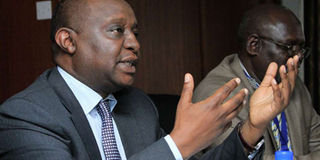Health crisis looms as CS Rotich fails to honour doctors’ pay deal

Treasury Cabinet Secretary Henry Rotich speaks before the Education, Research and Technology Committee on March 20, 2018, regarding the implementation of the lecturers' CBA. Mr Rotich said resources would be given to counties based on what the economy can generate. PHOTO | JEFF ANGOTE | NATION MEDIA GROUP
What you need to know:
- Mr Panyako warned that the nurses would disrupt health services in July to put pressure on the government to implement the CBA.
- KPMDU secretary-general Ouma Oluga said it is up to county governments to find ways of financing the CBA.
A national health crisis is looming after the government on Wednesday ruled out allocating Sh11.6 billion to the counties for doctors and nurses’ salaries as provided for in the Collective Bargaining Agreement signed last year.
Treasury Cabinet Secretary Henry Rotich said it would not be possible to provide the money and asked the counties to work within the Sh314 billion allocated to them, meaning that they will have to adjust their development budgets.
“Counties will have to reprioritise their budgets. Any additions in terms of wage bill must be managed within the equitable share of revenue,” Mr Rotich said when he appeared before the Finance and Budget committee of the Senate.
STRIKE
The decision was immediately opposed by the Council of Governors (CoG) and the Kenya National Union of Nurses (KNUN), which threatened to call a national strike.
CoG chairman Josphat Nanok warned that the move would derail the implementation of the CBA and accused the Treasury of reducing the road maintenance fund to counties from 20 per cent to 15 per cent.
“We hope that Senate will stand with governors to ensure that we have resources to deliver on our mandate. A number of counties are going to struggle to get the resources,” Mr Nanok, who is also the Turkana governor, said.
KNUN secretary-general Seth Panyako warned that the nurses would disrupt health services in July to put pressure on the government to implement the CBA.
“If they are trying to do that, then let them prepare because services will be paralysed,” he said.
UNIVERSAL HEALTHCARE
Kenya Medical Practitioners and Dentists’ Union (KPMDU) secretary-general Ouma Oluga said it is up to county governments to find ways of financing the CBA.
“It is the business of the national government and the counties to sort out their own problems. What we know is that we have a binding agreement in place that needs to be implemented,” Dr Oluga said.
The CBA was signed last year on November 2 by the nurses, doctors, the 47 county governments and the Health ministry to end a five-month long strike, which had totally crippled services in public hospitals.
The Treasury’s decision not to release the funds could work against the government’s stated objective to achieve affordable universal healthcare, which is part of the Jubilee administration’s 'Big Four' agenda.
It is also likely to rekindle the acrimonious relations between the two levels of government on revenue-sharing.
REVENUE
Mr Rotich called for a reduction of the budgets between the two levels of government as the country grapples with a Sh84 billion shortfall in revenue collection.
He said the national government was paying teachers, the military, police and other workers and told the governors to meet their own obligations to the doctors and nurses.
“Let everyone rationalise. The national government is doing away with hospitality and transport.
"It should not be that one level of government is struggling, while the other is busy spending as before. Things have changed,” he said.
PATIENTS
Services in the public health facilities ground to a halt across the country as the nurses and doctors downed tools in agitation for a CBA last year.
The strike saw some patients, especially expectant mothers, and children seek services in the neighbouring countries as the nurses dug in.
Mr Rotich said resources would be given to counties based on what the economy can generate and challenged the governors to improve their revenue collection systems.





